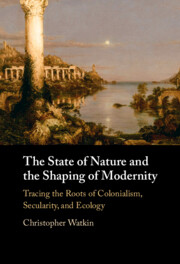Refine search
Actions for selected content:
76 results
Chapter 3 - Wollstonecraft and Godwin, Loving by the Book
-
- Book:
- Reading Sympathy in Romantic Literature
- Published online:
- 05 January 2026
- Print publication:
- 19 February 2026, pp 101-132
-
- Chapter
- Export citation
Chapter 4 - Bonaparte and His Collaborators
-
- Book:
- The People's Two Powers
- Published online:
- 20 February 2026
- Print publication:
- 19 February 2026, pp 107-135
-
- Chapter
- Export citation
Chapter 1 - Rousseau’s Democracy
-
- Book:
- The People's Two Powers
- Published online:
- 20 February 2026
- Print publication:
- 19 February 2026, pp 25-55
-
- Chapter
- Export citation
6 - What Is Democracy?
- from Part III - Democracy, Liberty, and Judicial Review
-
- Book:
- Democracy, Liberty, and Judicial Review
- Published online:
- 05 December 2025
- Print publication:
- 08 January 2026, pp 177-207
-
- Chapter
- Export citation
7 - Representation and Democracy
- from Part III - Democracy, Liberty, and Judicial Review
-
- Book:
- Democracy, Liberty, and Judicial Review
- Published online:
- 05 December 2025
- Print publication:
- 08 January 2026, pp 208-236
-
- Chapter
- Export citation
2 - The Imaginary Worlds of the State of Nature
- from Part I - Making Sense of the State of Nature
-
- Book:
- The State of Nature and the Shaping of Modernity
- Published online:
- 19 November 2025
- Print publication:
- 18 December 2025, pp 75-120
-
- Chapter
- Export citation

The State of Nature and the Shaping of Modernity
- Tracing the Roots of Colonialism, Secularity, and Ecology
-
- Published online:
- 19 November 2025
- Print publication:
- 18 December 2025
Chapter 10 - Rousseau, Contract, and the General Will
-
- Book:
- The Social Contract
- Published online:
- 30 May 2025
- Print publication:
- 04 September 2025, pp 114-127
-
- Chapter
- Export citation
Chapter 9 - Rousseau and Inequality
-
- Book:
- The Social Contract
- Published online:
- 30 May 2025
- Print publication:
- 04 September 2025, pp 105-113
-
- Chapter
- Export citation
From messianic republicanism to global constitutionalism: the paradigmatic changes of French public law through European law
-
- Journal:
- European Law Open ,
- Published online by Cambridge University Press:
- 22 August 2025, pp. 1-18
-
- Article
-
- You have access
- Open access
- HTML
- Export citation
Chapter 9 - States of Nature as Theories of Normativity
-
-
- Book:
- Kant's Lectures on Political Philosophy
- Published online:
- 18 July 2025
- Print publication:
- 07 August 2025, pp 161-178
-
- Chapter
- Export citation
Chapter 13 - Kant’s Retributive Turn
-
-
- Book:
- Kant's Lectures on Political Philosophy
- Published online:
- 18 July 2025
- Print publication:
- 07 August 2025, pp 238-255
-
- Chapter
- Export citation
Chapter 4 - Switzerland
- from Part I - Life and Death
-
-
- Book:
- Percy Shelley in Context
- Published online:
- 17 April 2025
- Print publication:
- 24 April 2025, pp 26-33
-
- Chapter
- Export citation
12 - Sovereignty
- from Part II - Modalities
-
-
- Book:
- The Cambridge Handbook of Constitutional Theory
- Published online:
- 27 March 2025
- Print publication:
- 24 April 2025, pp 192-207
-
- Chapter
- Export citation
4 - The Imaginary of the Modern Democratic Individual as a Political Agency
- from Part II - The Emergence of the Epistemological Constitution of Modern Democracy
-
- Book:
- Can Democracy Recover?
- Published online:
- 02 January 2025
- Print publication:
- 16 January 2025, pp 41-56
-
- Chapter
- Export citation
17 - Early Modernizers of Politics
- from Part V - Democracy beyond Modernity
-
- Book:
- Can Democracy Recover?
- Published online:
- 02 January 2025
- Print publication:
- 16 January 2025, pp 165-179
-
- Chapter
- Export citation
Chapter 2 - The Wheel, 1785–1789
-
- Book:
- A Republic of Sympathy
- Published online:
- 18 December 2024
- Print publication:
- 05 December 2024, pp 40-65
-
- Chapter
- Export citation
Chapter 1 - The Letters, 1786
-
- Book:
- A Republic of Sympathy
- Published online:
- 18 December 2024
- Print publication:
- 05 December 2024, pp 16-39
-
- Chapter
- Export citation
11 - Regulatory Legitimacy
- from Part III - Evaluation
-
- Book:
- An Introduction to Law and Regulation
- Published online:
- 22 November 2024
- Print publication:
- 28 November 2024, pp 321-356
-
- Chapter
- Export citation
2 - The Legacy of Rousseau
-
- Book:
- Romantic Music Aesthetics
- Published online:
- 22 November 2024
- Print publication:
- 21 November 2024, pp 50-74
-
- Chapter
- Export citation
